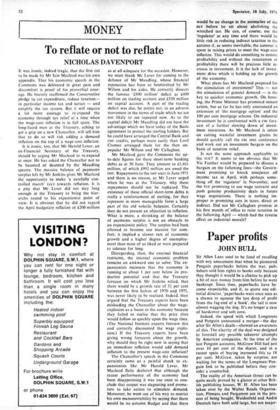MONEY To reflate or not to reflate
NICHOLAS DAVENPORT
It is ironic, too, that Mr Harold Lever, an ex-Financial Secretary of the Treasury, should be urging Mr Macleod to re-expand at once. He has asked the Chancellor not to be haunted or daunted by the Maudling spectre. The massive balance of payments surplus left by Mr Jenkins gives Mr Macleod the opportunity to make 'a carefully con- trolled march' (sic) towards reflation. It is a pity that Mr Lever did not stay long enough in the Treasury to bring the hier- archs round to his expansionist point of view. It is obvious that he did not regard the April budgetary reflation of £200 million as at all adequate for the occasion. However, we must thank Mr Lever for coming to the defence of Mr Maudling, whose financial reputation has been so besmirched by Mr Wilson and his aides. He correctly dissects the famous `£800 million' deficit as £400 million on trading account and £350 million on capital account. A part of the trading deficit was due, he points out, to an adverse movement in the terms of trade which we are not likely to see repeated now. As to the capital deficit Mr Maudling did not have the advantage which we have today of the Basle agreement to protect the sterling holders. But he could have arranged the Central Bank and IMF credits, perhaps more easily than Lord Cromer arranged them for the then un- popular Mr Wilson and Mr Callaghan.
Mr Macleod, gave the Commons the up- to-date figures for these short-term banking debts as at 30 June. They amount to £1,461 million, of which £992 million are owed the TMF. Repayments to the IMF start in June 1971 and there is no reason, as Mr Lever urged when he was at the Treasury, why these repayments should not be rephased. The existence of these official short-term debts is really a reinforcement of sterling, for they represent in more manageable form a large part of the old volatile balances. Certainly they do not present an objection to reflation. What is more, a shrinking of the balance of payments surplus is not an obstacle to an expansionist policy. The surplus had been allowed to become too massive for com- fort; it implied a slower rate of economic growth and a higher degree of unemploy- ment than most of us liked or were prepared to tolerate for long.
Disregarding, then, the external financial restraints, the internal economic problem remains an awkward one to solve. The ex- pansionists maintain that the economy is running at about 1 per cent below its pro- ductive potential and that the Treasury forecast on which Mr Jenkins relied, that there would be a growth rate of 31 per cent between the first halves of 1970 and 1971, was never likely to be realised. Indeed, they argued that the Treasury experts have been misleading the Chancellor about the wage- explosion as .a boost to the economy because they failed to realise that the price rises would follow so quickly upon the wage rises. (The National Institute experts foresaw this and correctly discounted the wage explo- sion.) If the Treasury experts have been giving wrong forecasts about the growth, why should they be right now in saying that an immediate reflation would add demand inflation to the present wage-cost inflation?
The Chancellor's speech in the Commons certainly came as a painful shock to ex- pansionists like Mr Harold Lever. Mr Macleod flatly declared that although the recent performance of the economy had been disappointing it was too soon to con- clude that output was stagnating and prema- ture to take action to stimulate demand. Moreover, he went out of his way to restrict his own manoeuvrability by saying that there would be no autumn Budget and that there
would be no change in the anomalies of the SET before he set about abolishing the wretched tax. He can, of course, use the `regulator' at any time and there would be little risk in reducing indirect taxation in the autumn if, as seems inevitable, the summer is spent in raising prices to meet the wage-cost inflation. This would do something to restore profitability and without the restoration of profitability there will be precious little in- crease in investment. It is the lack of invest- ment drive which is holding up the growth of the economy.
What plans has Mr Macleod prepared for the stimulation of investment? This — not the stimulation of general demand — is the key to quicker economic growth. On hous- ing, the Prime Minister has promised instant action, but so far he has only announced an extension of 'the mortgage option' and the 100 per cent mortgage scheme. On industrial investment he is confronted with a cm fore- cast of a further slowing down of invest- ment intentions. As Mr Macleod is intent -on cutting wasteful investment grants he should quickly call the cm into conference and work out an investment bargain on the basis of taxation relief.
Is not the same approach applicable to the Ttic? It seems to me obvious that Mr Vic Feather would be prepared to discuss a bargain on the following lines—the Govern- ment promising to knock ninepence off income tax in April, with perhaps some- thing off the 'regulator' in November, and the TUC promising to use wage restraint and push genuine productivity deals in future wage negotiations. There is nothing im- proper in promising cuts in taxes, direct or indirect. Did not Mr Callaghan promise in his first month of 'office to raise taxation in the following April — which had the reverse effect on industrial morale?






















































 Previous page
Previous page